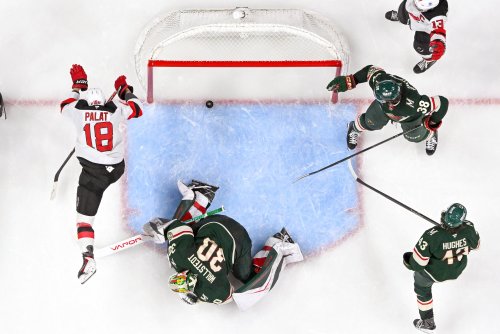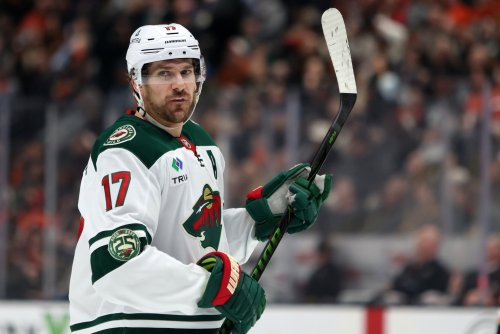
It happened. It finally happened.
Some Wild fans have been clamoring for Chuck Fletcher’s firing for several years, though I really wasn’t one of those until very recently. I’ve always seen Fletcher as a very good GM, one that made his plan clear from the beginning and executed it to near perfection. He had gotten the team to a point where it seemed to be just a good break or a hot streak away from making a legitimate run to the Conference Finals and beyond.
But over the course of the past two or three seasons of Fletcher’s doomed tenure, he also seemed to be getting himself onto thinner and thinner ice (hockey pun intended), as he made one job-saving move after another just to keep himself in the relative good graces of fans and ownership. During that time, it became increasingly apparent that although the original strategy was carried out well, it simply was no longer pushing the organization forward. He had taken the team as far as he could realistically take it.
Strangely, in a season that was widely publicized as the final year of Fletcher’s contract, he finally decided to take a laissez faire approach and let his carefully constructed group of mid-twenties-aged players carry the torch. There was no magical move to be made, so after an offseason that saw more subtraction from the team than addition—Fletcher dumped Alex Tuch and Erik Haula in the expansion process, traded away Jason Pominville and Marco Scandella, and allowed trade deadline calamity Martin Hanzal to walk—he sat back and watched his guys cost him his job.
Fletcher’s Road Map
In those first few seasons, Fletcher made clear what his road map to success would be; build a solid young core, then land a couple of “big fish” in free agency to bring the team back to legitimacy. One could argue that Fletcher actually executed his scheme to perfection, as he did quickly assemble a solid stable of young stallions, and he did shock the hockey world by reeling in not one, but two superstar free agents in the same offseason.
Phase I of the plan happened relatively quickly, as Fletcher rapidly developed one of the deepest prospect pools in the NHL. We’ve watched Chuck’s so-called “young core”—which features such players as Jason Zucker, Charlie Coyle, Mikael Granlund, Nino Niederreiter, Matt Dumba, Jared Spurgeon, and Jonas Brodin—mature over the years into an impressive group of talented, mostly home-grown NHL players.
Phase II was successfully completed when—once he felt the time was right and the proper players were available—Fletcher showed his mettle as a salesman by successfully bringing in the two best talents on the 2012 free agent market in Zach Parise and Ryan Suter.
By year four of the Fletcher Era, the Wild was a perennial contender.
Where It Went Wrong
The issue with Fletcher’s plan was that it simply didn’t have a Phase III. The well-executed first phases got Minnesota back into legitimacy and raised the expectations surrounding the team. But once it got to that point, there simply wasn’t anywhere else for Fletcher to steer the organization, as he clearly had no interest in moving on from any of the guys that had gotten him through Phase II and still had upside. Plus, he had dished out too many long-term veteran contracts to be able to significantly improve the roster. So once Phase II was completed, Phase III was essentially to hope that Phases I and II—plus tinkering with a vast variety of individual pieces—were executed so flawlessly that they alone were enough to deliver a championship to Minnesota.
The young core—which saw several of its players emerge in the past few seasons as legitimate top-level NHL talent—has had a few of its members consistently go cold in the playoffs, exactly when Chuck has needed them to step up the most. The result has been early exits from the postseason for six years in a row, and for an owner who badly wants a Stanley Cup, that’s just not good enough.
A few of the “youngsters” did play tremendous hockey during this short postseason. For example, Dumba was outstanding in a few of the games against Winnipeg, despite being unexpectedly thrust into a role as a nearly thirty-minute-per-night defender. Brodin, Dumba’s partner on the top pairing, also performed well in the elevated position, and proved his worth as a top-four blueliner for this organization for the foreseeable future. Meanwhile, guys like Granlund—who had a goal and two dazzling assists in five games—and Spurgeon—who was playing on one hamstring—performed admirably enough to make it seem like they belong on this team, even with a new regime pulling the strings.
But there were three players from the group—I won’t name names now, but I bet you can figure out who those players are—that simply didn’t show up. Sorry, but if my GM—the guy that drafted, developed, and believed in me enough to help me launch a successful NHL career—is going to bet his own personal farm on me to step up and carry the load... well... I’m going to do everything in my power to successfully haul my own weight and more. But sadly for Fletcher, a few of his guys—in whom he laid all of his trust—simply did not do enough... again.
What’s Next?
Now, a new GM will have the opportunity to tweak that young core that Chuck spent so much time and energy fostering. His replacement will have the chance to reassemble the group with players that he or she believes can finally get this team over the proverbial hump.
This most recent early exit represented a clear-as-day depiction of the need for change to the young core. With both of the team’s “big fish” simultaneously dealing with injuries in Minnesota’s lone postseason series of the year, Fletcher desperately needed his young core to take control of the series against Winnipeg. It did not.
So, Wilderness, who stays and who goes? And who finally gets this team over the hump, once and for all?
Think you could write a story like this? Hockey Wilderness wants you to develop your voice, find an audience, and we'll pay you to do it. Just fill out this form.







Recommended Comments
There are no comments to display.
Join the conversation
You can post now and register later. If you have an account, sign in now to post with your account.
Note: Your post will require moderator approval before it will be visible.